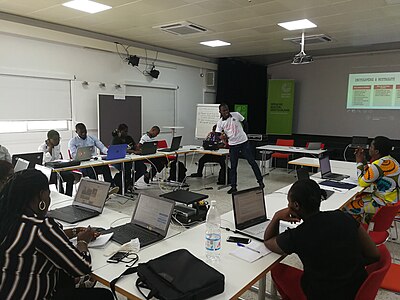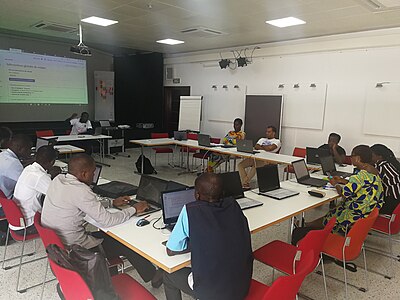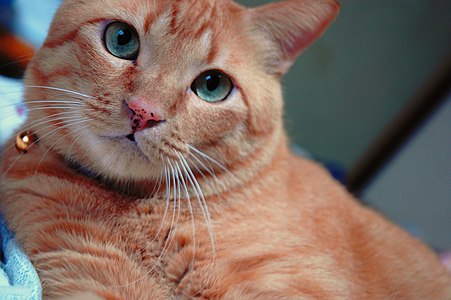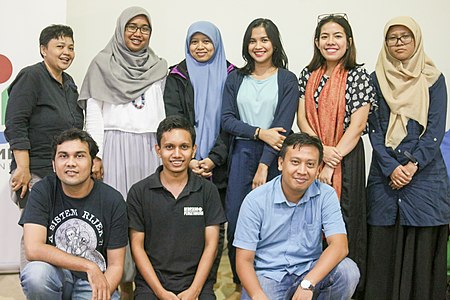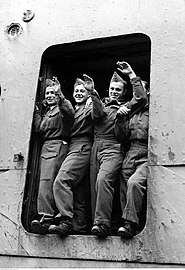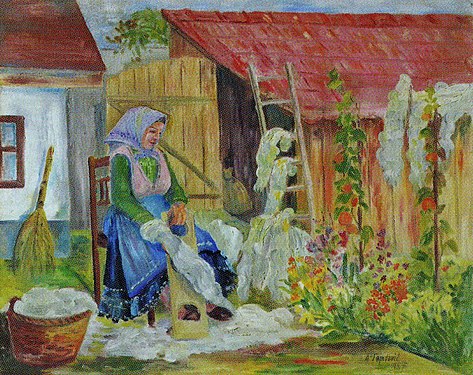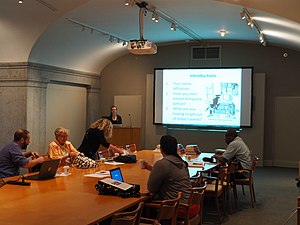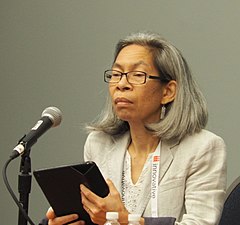GLAM/Newsletter/June 2019/Single
Third round of cooperation with Hovhannes Toumanian Museum
Third round of cooperation with Hovhannes Toumanian Museum
Wikimedia Armenia started GLAM cooperation with Hovhannes Toumanian Museum since February of this year, during which were scanned the personal letters of Hovhannes Toumanian, the original versions of particular quatrians, were published many personal photos of famous Armenian writer.
The next part of collaboration was creating and proofreading articles and pages about Hovhannes Toumanian and his literary works in Wikipedia and Wikisource. During June The Wikiclubs of Wikimedia Armenia created articles about Hovhannes Toumanians’ literary works․ In just this month, the number of created articles is 140. The necessary materials were provided within the framework of GLAM cooperation between Wikimedia Armenia and Hovhannes Toumanyan Museum.
Besides that, the Members of Wikiclubs are proofreading 10 volumes of prominent Armenian writer. At this moment, 6 volumes of 10 are already proofread and validated.
- Some material provided by the Museum during cooperation with Wikimedia Armenia
Toodyaypedia, City of Canning, WoW2019, and the Pilbara
Toodyaypedia

Toodyaypedia is a collaborative project between the Shire of Toodyay, Toodyay Historical Society (THS) and Wikimedia Australia (WMAU). It started following a discussion between the President of the Toodyay Historical Society and Wikimedians who were attending the Western Australian State Heritage Awards in 2013. The Wikimedians were invited to join a walk with the Shire CEO and THS members, to obtain and check GPS coordinates of the camp of Western Australia's notorious bushranger Moondyne Joe as well as a marker point built by John Forrest that is found in the more recently named Moondyne Nature Reserve.
Since then the collaboration has seen the creation of a Wiki Town using QRpedia codes, the first stage of which was to write articles on the heritage listed buildings. This was followed by the second stage which focused on some of the notable people from Toodyay over time.
On Saturday 29th of June 2019 the result of stage three, was publicly launched. It had involved the Shire engaging a local historian Alison Cromb to research and verify the information used for a trail booklet that had been created in 1988 during Australia's Bi-centennial year a trail through West Toodyay - the original town site of Toodyay now known as West Toodyay.
Alisons' research on the topics and places started to turn up some inconsistencies in what was written and what the official records showed. One them was that there had been two different Royal Oak Hotels built at different locations and that when the 1988 trail was created, their two histories had been amalgamated into one place. Another challenge was finding the original ford crossing point of the Avon river, which would help to locate the very early places built.
Significantly arising as an issue was the QRpedia software which having been utilised in the two earlier stages of the project had problems arising, as a consequence, both Wikimedia Australia and Wikimedia UK began working on fixing the issues.
From the research conducted to date, the Shire now has 3 large markers with brass plaques to be moved to the correct locations, another marker that needs to replaced by two markers. Wikimedia Australia and Wikimedia UK still some software issue to address, Toodyay Historical Society has a whole new perspective on the history of early development in the Toodyay area.
What started out as a small group of people some 6 years previously, has grown into a whole-of-town project.
The next step will be using the WMAU digitization kit, which is made available through the local Wiki Club West editing community to facilitate digitizing photographs, recording personal histories, and collecting and recording other materials from the wider community. The material collected as a result is collaboratively shared between the wikipedian locations such as wikidata, wiki commons and wikipedia articles, as well being material that can consolidate and compliment the historical society and shire's understanding of the resources that are available.
The collected information will help inform the topics of stages 4 and 5 of Toodyaypedia, and all the collaborators looking forward to celebrating 10 years of collaboration in the process.
Update:10 June: WMUK has been hard at a work and a temporary fix is now in place with all QRcodes working.
City of Canning
Over the month Wikimedia Australia's Western Australian branch in the form of Wiki Club West has been conducting a series of talks and workshop in the local libraries operated by the w:Perth, metropolitan City of Canning with the aim of collaborative learning about the history of Canning, and being involved with digitizing the City of Canning local history collection. This project started when one the people behind the development of Noongar Wikipedia, (currently in the Incubator) started working at the City and wanted to continue with those efforts in whatever way was possible. The next step is to conduct a series of training workshops where there will be digitizing of the collection and uploading material to Wikimedia Commons as well as telling the stories about the City of Canning. Wiki Club West, and Wikimedia Australia would like to acknowledge the City of Canning for the enthusiasm in being involved in this collaborative project. The City of Canning kindly supported Ingrid Cumming speaking at the World of Wikimedia Conference in Sydney, and at the WMAU Community conference.
World of Wikimedia Conference

It must be noted that the conference being described here is possibly the first event of its kind in Australia, a specifically wikimedia related conference, where academic participants and the wikipedian community of Australia were able to be involved in a collaborative exploration of issues and topics that relate to the world of, and future of wikipedia.
Worlds of Wikimedia Conference was held at the University of Sydney in June 2019. The conference had an interesting variety of speakers about various activities related to Wikimedia world. The opening night was a talk by Dr Martin Dittus from the Oxford Internet Institute, the talk explored visualizing online practices and some the ways it can be used to identify holes in knowledge and participation. The following day we were welcomed to country by Uncle Alan. A Welcome to Country is a common practice that has taken place for millennia that acknowledges the Indigenous country, elders both past and present, and aims to create a safe environment for everyone to engage freely. One of the keynote speakers was Liam Wyatt who had returned home from his adventures with GLAMwiki Europeana especially for the conference. We heard from Professor Jakelin Troy (a Ngarigu person from the Snowy Mountains area) who is working with Indigenous language groups in Pakistan with Adan Bhatti. Bunty Avieson gave us an insight in to her work in Bhutan and the use of Wikipedia. Other speakers included Dr Carwil Bjork-James; Dr Toby Hudson on Wikidata; and Kerry Raymond on semi-automating article creation using freely-licensed Australian Government heritage records.

Following the WOW conference, WMAU held its first community conference in Australia, in facilities enabled by the organizers of the WOW conference, allowing the WMAU the opportunity to hear from members of the Australian wikipedia community. The WMAU benefited greatly by having the two conferences coincide, and is very appreciative of the opportunity that the University of Sydney organizers created for the community.
Pilbara regional libraries' meeting

On 11 June a member of WikiClubWest gave a presentation about Wikimedia to the Pilbara regional libraries meeting in Western Australia. This is an annual conference for people working in the public libraries of the Ashburton, East Pilbara, Karratha, and Port Hedland local government areas. There were about 15 librarians present, and lots of discussion about how to get the libraries more engaged online. They are considering setting up their own internal private cross-Pilbara wiki, as well as possibly a public local history wiki similar to the Birtwistle wiki. There is not always good internet connectivity in the region, distances are large, and the weather can be extreme (e.g. Marble Bar recorded their highest-ever temperature this year, of 49.3°C), so there are challenges with getting people contributing to Wikimedia projects. But there is a will to be involved, and a great wealth of historical and contemporary stories that are not widely known, so hopefully more partnerships will develop and we'll be see more of their content on Wikimedia projects.
Partnership with Football Museum brings visibility to entries about women’s soccer on Wikipedia




Brazil is internationally known as “the land of soccer”. However, not everybody is aware that for more than 40 years, women were prohibited by law from playing soccer in the country.
"Women will not be allowed to practice sports incompatible with the conditions of their nature, and for this purpose, the National Sports Council must download the necessary instructions to the sporting entities of the country," had been decreed in 1941 in the context of the Vargas Era dictatorship, so that women were prohibited by law from practising sports considered masculine - including soccer.
Even with the ban, women continued to play soccer and in 1983 had the legal endorsement back for the sport practice. However, this gap of more than 40 years in illegality has further boosted the barriers to equal visibility in men's and women's soccer and has consequences to date. As in many parts of the world, women's soccer in Brazil is not widely recognized, encouraged or respected.
Therefore, the Football Museum, located in the Pacaembu Stadium in São Paulo organized the temporary exhibition Counter-attack: Women of Football on the practice in Brazil before the context of the beginning of this year's FIFA Women's World Cup. The exhibition celebrates the achievements of women invisibilized in the history of national soccer and draws attention to the still needed visibility for gender equality on and off the field. Throughout the curatorship of the exhibition, the team of the Football Museum encountered difficulties in finding documents about women's soccer in Brazil. In contrast to men's soccer, there is still a lack of consistent documentation of matches and women's team championships in Brazil, as well as biographies of notable female players - an issue that also affects Wikipedia.
The year 2019 marks a significant advance for the visibility of women's soccer in Brazil: the World Cup matches of the women’s team will be broadcast on open television for the first time. Is the perfect occasion for many spectators and journalists to do research on Wikipedia on the players. With that in mind, sports journalist from Yahoo Esportes Olga Bagatini reached out to Wiki Movimento Brasil and in a partnership with Football Museum we organized an edit-a-thon focused on improving and creating entries women in Brazilian soccer. We created articles for the Brazilian players who were called to the World Cup in France and for players who marked the history of our national soccer. We also have listed other notable female players entries to be translated from other Wikipedias and debated the necessity of more entries on the trajectory of women’s soccer itself.
Throughout the #WikiFutFeminino event, we came across the lack of good references and realized that independent portals that cover women's soccer have more cured information on the theme than major sports portals - which further signals the need for more media attention for coverage of the modality. We also highlight the importance of partnering with museums, libraries and archives that have books, documents and other references on specific issues of edit-a-thons since they provide enormous base for good Wikipedia entries that have a direct effect on the quality of information on the internet.
We gathered for this edit-a-thon with another 20 journalists and volunteers at the library of the Reference Center of Brazilian Football at the Football Museum on June 1st, almost a week before the start of the FIFA Women’s World Cup. Until the publication of this newsletter, the 22 entries created and the 95 entries edited total more than 803 thousand views - and growing! But it’s not the end: while the gap on lusophone Wikipedia on women’s soccer is still an issue to be addressed, we intend to organize other editions of the edit-a-thon on the Football Museum to help tie the game.
#1Lib1Ref edit-athons and restrospective of +190 articles improved
The Goethe-Institut hosts a second edit-athon with 15 librarians and journalists
For the second time, a 1Lib1Ref edit-athon took place within the Goethe-Institut, following that of February 2019. This edit-athon of June focused on the literature of Côte d'Ivoire and West Africa. Participants shared a restrospective experience in 5min. Each of them detailed how they had been practicing the skills acquired back in the session of February 2019.
190 articles improved, +3 million views and more
Overall more than 190 articles revolving around litterature topics (writers biographies, plays, novels) were improved during the sessions of February 16-17 and June 22, 2019. In addition, 1020 edits were made on the French Wikipedia, and +62,500 octets added. The articles edited attracted 3.38 million of views from February to June 2019.
Pictures taken during the session
Regular workshops
Regular workshops
- Archiwiki Femmes: the monthly workshops has continued in Montpellier with the last one on 1st June. The archives de l'Hérault has organised regular workshops in the framework of a partnerships with Wikimedia France dedicated to heritage and gender gap thematics. This schedule is available for all the year, all interested attendees are welcome !
- The Médiathèque Andrè Malraux of Strasbourg has organised the last workshop before summer holidays on Saturday 8 June. These 3-4 hours workshops are generally dedicated to Wikipedia, Wikisource and Wiktionary and open for beginners. Here is an example of articles created during the event: Patriotes résistant à l'occupation.
Introduction to Wikimedia Commons and Structured data
Introduction to Wikimedia Commons and Structured data
On June 25, 2019, a workshop was held in Jakarta to introduce Wikimedia Commons and how to contribute to Commons in a best way. This was an initiative of GLAM 2018 project by Wikimedia Indonesia together with Creative Commons Indonesia. The workshop was participated by nine participants who are new to this project.
The workshop was divided into 3 parts: (1) introduction to Wikimedia Commons and licenses accepted in Commons, (2) introduction to Structured data on Commons, and (3) getting started to the most useful Commons gadgets to organize files.
Hilman Fathoni (Creative Commons Indonesia) began the session by introducing Wikimedia Commons as one of the free-licensed media repositories on the internet, alongside archive.org, etc. He then introduced Creative Commons ("CC"), OGL, and GNU as licenses that are often used by the licensor to their files and media published to Commons. Some Creative Commons rights are also explained, including CC BY and CC BY-SA which are standard free licenses used in Commons.
Rachmat Wahidi (Wikimedia Indonesia) continued the session with an explanation of Structured data on Commons, by utilizing multilingual caption and depict features. Examples of its use can be seen in File:Tora the Cat, Sakaiminato, Tottori Prefecture, November 2012.jpg which has been equipped with English and Indonesian captions, and depiction of house cat (Q146) and also equipped with "color" and "use" qualifiers.
In the last session, Rachmat introduced the Cat-a-lot and FileRename gadgets, whose function to do batch media categorization and batch files renaming in Commons. An example of a file whose name has been changed is File:Kampung Naga, Tasikmalaya 2.jpg and File:Orang duduk di mobil mengangkut pohon jagung.jpg.
Wiki Loves Mexico
Wiki Loves Mexico Award ceremony and exhibition
Last June 25, 2019 we made a ceremony and an exhibition in Mexico City for the winners of the first edition of Wiki Loves Mexico.
Carmen Alcázar, president of Wikimedia Mexico, highlighted the success of the first edition of the photographic contest that showed many cultural expressions of Mexico with free licensed materials ready to use in the Wikimedia projects. "We are happy for the hundreds of photos that were sent by people from whole Mexico," Carmen said. Cristian Jiménez, one of the winners of the "Knowledge and Practices Concerning Nature and the Universe" category shared his experience recognizing that he have always wanted to retribute Wikipedia for all the knowledges I have gained reading the encyclopaedia. "I was already satisfied uploading my photos and with that in some sense give back something to Wikipedia but when I received the news of being one of the winners of this national contest I felt so honored and excited", Jiménez said.
Unfortunately not all the winners was based in Mexico City, place of the ceremony, but others like Brian Leon came to the ceremony from Acapulco, Guerrero, 400 kilometers far from the capital. "Sharing my photos with Wikipedia is a way to share with the world the huge cultural heritage of my state, Guerrero, I will be happy if more people with my work can see the richness of the places I have the luck to meet", Brian said.
All the winner photos were exhibited in the place of ceremony. Prizes like tablets was provided by Secretariat of Culture of Mexico and Amazon gift cards was given with the support of a Wikimedia Foundation grant.
Image donation; Wiki goes Caribbean meeting on slavery and plantations in Suriname; Dutch open public library data; Field study collaboration Wikimedia and Libraries
[Image donation] Catchpenny prints from the 18th until early 20th century from the collection of the KB
The KB, national libary of The Netherlands, donated 1280 catchpenny prints from the 18th until early 20th century to Wikimedia Commons.
Catchpenny prints give a good picture of the topics the population was interested in. For researchers and people interested in the history of the Netherlands this is a real treasure-house containing images and texts from the past. They can be regarded as source material for research of text and language; of the daily life of our ancestors plying trades (that have disappeared), children's games, transport, fashion, role patterns, housing and housekeeping; tilling the land, poverty and wealth; of values and standards and pedagogical views and of image with illustration techniques and styles.
For more background reading (in Dutch): https://www.kb.nl/themas/kinderboeken-en-strips/centsprenten-in-de-kb
-
Honden en katten, collectie KB
-
De walvisch is te groot, om 's middags op te disschen, Kiest kindren, voor uw smaek een soort van andre visschen, collectie KB
-
Zie lieve kind'ren op deze prent, waerop we u tachtig plaatjes lieten malen, collectie KB
-
Garde impériale Turque, collectie KB
-
Ziet, kindren lief, deez' trouwe hond, wacht zeker, tot zijn meester komt, collectie KB
-
Der vaad'ren deugd en kloek bestaan, Toont deze prent ons duidelijk aan, collectie KB
-
Kort verhael van den verloren zoon, collectie KB
-
Eenhoevige dieren, collectie KB
-
Van velerlei gebak en ook van lekkernij, is deze prent voorzien, wat uwe keus ook zij, collectie KB
-
Daar hebt gij, kinderen, weer een tal Van twee paar uitgezochte platen
Wiki goes Caribbean meeting on slavery and plantations in Suriname

Every month the Wiki goes Caribbean project organises an editathon on specific subject in Suriname and The (Dutch) Caribbean to improve, update and extend the information on these countries on Wikipedia, Wikidata and Wikimedia Commons. June 15th there was a special edition with the theme of 'Slavery and Plantations' in Suriname. We invited several speakers to give 30 minutes presentations: Victor Bottenbley (Research team Kaikoesi) on the Arawak people, Maarten van der Bent (Researcher at the Royal Netherlands Institute of Southeast Asian and Caribbean Studies) on the Maroon people and Danielle Jansen (Wiki goes Caribbean on the slavery project). After the presentations we photographed (and ate!) some Caribbean delicacies and after this delicious lunch we continued the day with an editathon on the theme for the day. People researched the National Archives for documentation, uploaded images and maps from several museums and other archives to Wikimedia Commons. And of course together with about two dozen people we improved, updated and extended articles on Wikipedia. The next Wiki goes Caribbean editathon on the 20th of July will be on 'Food and Drink': this time we will photograph, describe (and the eat!) delicacies from Suriname and the Dutch Caribbean.
Outcomes Field study collaboration Wikimedia and Libraries
In June, WMNL submitted the final report of the field study on collaboration between Wikimedia and Dutch libraries to the sponsor Stichting PICA. In the study we looked for an answer to the question whether sustainable cooperation between Wikimedia and Dutch libraries will yield results for both parties in the short term. The answer we found is Yes. A total of 18 libraries signed a declaration of intent for a follow-up project to shape sustainable cooperation. During the summer months, a new project proposal will be written that will be presented to the PICA Foundation in September.
Dutch open public library data
Directly inspired by a lightning talk from GLAM-Wiki 2018 the KB (national libary of The Netherlands) is currently running a project to improve the coverage and visibility of public libraries in the Netherlands on Wikidata.
Although there are a number of websites listing all these plusminus 1500 libraries, we were quite surprised to find that none of them provide both structured and openly licensed, let alone linked data, while openness should be at the the core of every library's mission.
We decided to solve this problem by adding address and geo data of every public library to Wikidata, hence for the very first time creating a 5-star linked open data set for this type of library. This enables innovative uses, such as overviews and visualisations of the Dutch public library landscape on organisational, municipal, regional, provincial and national levels. This is of interest not only to Wikipedia and LOD enthousiasts, but also to e.g. policy makers, municipalities, scientists and journalists.
In addition, to enable SPARQL generated library image galleries, in the autumn we will start '1Lib1Photo' (inspired by 1Lib1Ref), an initiatieve to add an openly licensed image of every Dutch public library to Wikimedia Commons.
The International Year of Indigenous Languages 2019
Conferences and festivals
-
Kimberli Mäkäräinen from Wikimedia Finland and Jon Harald Søby from Wikimedia Norge at Celtic Knot 2019
-
Riddu Riđđu Festival 2018. The festival organizers generously shared all festival photos under a free license
-
Staff members from Wikimedia Norge at Márkomeannu festival 2018
2019 is The International Year of Indigenous Languages. Wikimedia Norge, also a civil society partners with UNESCO in marking this year, are doing many different activities throughout the year to celebrate this. This work is also an important part of our ongoing project of adding more Sámi related content to the Wikimedia projects, in close collaboration with our GLAM partners and institutional Sámi partners.
Wikimedia Norge took part at the Celtic Knot Conference in Cornwall in the beginning of July 2019 with a presentation on this topic: In the spirit of UNESCO's International Year of Indigenous Languages, we would like to present the work that is done in Norway and Finland to support the dissemination of Sámi knowledge on the Wikimedia projects.
Staff members and volunteers will in the coming weeks take part at the Riddu Riđđu Festival, an indigenous music festival, and the Márkomeannu festival, a Sámi festival. At Riddu Riđđu Festival we will do different outreach activities and a video collaboration with WikiTongues to mark the The International Year of Indigenous Languages 2019. Our participation at the festival is partly funded by UNESCO Norway. Our participation at Márkomeannu festival happens in collaboration with Nordland County Library and during the festival we will take part in an event with the local Sámi Language Center called Várdobáiki. Our collaboration with the Sámi Language Center Várdobáiki is funded by the Fritt Ord (Free Speech) Foundation in Norway.
We hope to see all our wiki friends at Wikimania in Stockholm in August. Come join the Sámi Language Course on Saturday evening!
Documentary photographs from National Archives and WikiPlato
New images from the National Archives and a total of 10k images shared to Wikimedia Commons
The National Digital Archive contributed nearly 2,500 thousand historical photographs to Wikimedia Commons. The majority of the photographs date from 1939-1945 and originate from the newspapers of the period. Another set of 470 photographs is a very interesting collection of images archived by the Ministry of Information and Documentation of the Government of the Republic of Poland in exile. These photographs picture Polish, Russian and German soldiers, wartime operations, as well as soldiers' and officers' daily life. The collection is a valuable resource for research as well as a great source for illustrating historical articles on Wikipedia.

The images were uploaded on the 100th anniversary of the Polish National Archives. With the recent upload the total number of files uploaded to Wikimedia Commons thanks to the cooperation with the Archives has exceeded 10 000.
All the photographs can be seen here. We hope that Wikipedians will help to categorise the new files (files waiting to be categorized can be found here). More on the collection can be found in Polish on the Wikimedia Polska blog.
Wiki-Plato

The summer school "Plato Academy" in Lanckorona on September 23-30, 2019, will feature workshops devoted to editing Wikipedia. The organisers of the event, together with Wikimedia Polska, aim to critically asess the existing Wikipedia entries related to the subject of Plato and platonic philosophy and enriching them by new source materials, references to Plato's philosophy, latest interpretations od Plato and contemporary philosophers. The participants also aim to create or expand articles on Plato's main ideas and articles about contemporary philosophers whose ideas relate to those of Plato.
Thanks to the collaboration between the Plato Academy and Wikimedia and the planned activities of scholars, articles on the above subjects will be improved by experts and the resulting content can reach a wide audience. More information can be found on the Wikiproject.
Continuation of residences
Wikipedian in residence at Serbian National Theatre
Wikipedian in residence in the Serbian National Theatre, Jelena Latov Papić, accomplished good results in the first month of her residence, uploading an extraordinary photos of artists from this eminent theatre. Considering the fact that this institution has a lot of interesting materials from Serbian theatre history to release, the residence is extended for one more month. Expected outcomes are around 500 images and 20 new and improved articles on Serbian Wikipedia.
Wikpedian in residence at Museum of voivodinian Slovaks
New residence of Wikipedian has started in the Museum of voivodinian Slovaks, in Bački Petrovac. This museum joined GLAM program last year, participating in the GLAM seminar held in the Museum of Vojvodina, and later releasing very interesting photos, within the project Wikimedian in decentralization. Proven WIR Aleksandar Tumarić will upload over 400 released images on Wikimedia Commons, digitize 5 books, and write 70 new articles on Serbian Wikipedia. For the employees in the Museum will be organized a workshop of editing Wikipedia. This residence is financed by Serbian Ministry of Culture and Information.
Wikidata imports; Data roundtripping project
Wikidata imports of Swedish Open Cultural Heritage URIs
Volunteers has imported Swedish Open Cultural Heritage (K-samsök) URIs to Wikidata. The import focused on authorities from the National Museums of World Culture. This adds to previous imports of SOCH URIs focused on buildings, publications and monuments.
The data roundtripping project comes to an end

The Wikimedia Commons Data Roundtripping project has been finalized. The project researched the opportunity for galleries, libraries, archives and museums (GLAMs) to utilize Wikimedia platforms for engaging contributors to enrich its content (metadata additions, translations, etc). Furthermore, it researched ingesting this data into the institutions’ master data repositories. The project surveyed the needs and expectations of GLAMs and performed in-depth interviews. Following this research, the project executed three pilots together with museums exploring the process from upload to ingestion. This report discusses observations and findings concerning data quality, data modelling, contributor behavior, tooling, and ingestion. Finally the report lists potential work as well as recommendations for the project’s stakeholders.
Although this project has been finalized, two museums are in the process of taking the learnings into action and the Swedish National Heritage Board plans to spread the results through seminars and blog post during the second half of 2019.
GLAM related activities at Wikimania
If you are planning to come to Stockholm this summer for Wikimania, remember to check out the related activities as there are both culture crawls, guided tours at museums, edit-a-thons and other GLAM related things on the agenda. The Hackathon also has a track dedicated for GLAM, and you can either participate if you care to hack or suggest ideas for others to build or develop.
Oxford and Coventry Updates
Oxford
As part of the Astrolabe Explorer project, the Adler Planetarium in Chicago have donated a data set and images for 97 astrolabes. These will be added to Wikidata and Commons during July.
June was spent making software improvements to Astrolabe Explorer, Collection Explorer and The Sibthorp-Bauer Expedition so that they should load more quickly. I also made a script to find pages on Wikipedia and Commons that relate to specific collection items, retrieve links that might be outdated, and suggest links based on Wikidata's external link for that item. See example output at w:en:Wikipedia:GLAM/Ashmolean/Link_check.
Discussions about a GLAM partnership with the Ashmolean Museum have fallen through due to lack of funds. The University of Oxford is looking at options for long term preservation of Digital Humanities data, and I have been advising on the role that could be played by Wikidata in making links across different data sets.
Coventry
Andy Mabbett (User:Pigsonthewing) started a two-year, part time Wikimedia Residency at Coventry University, in a post supported by WikimediaUK. The primary purpose of the role is education-related, to encourage and assist teaching staff to make use of Wikipedia, and its sister projects, as a tool for active learning, teaching and assessment, but the job also has a GLAM component, so he will be working with the university's librarians and publishing staff on campaigns like #1Lib1Ref, and WikiCite, and with the archives team on making use of Coventry's specialist collections, not least the Lanchester and Ellen Terry archives. There will also be some community outreach activities, bridging the "town and gown" divide, and anticipating 2021, when Coventry is the United Kingdom's "City of Culture".
Andy explains more in his introductory blog post and Wikimedia project page.
LGBTQ+ Pride
SAAM LGBTQ+ Edition
the Smithsonian American Art Museum, and Wikimedia DC held a meetup, Wikipedia Edit a Thon LGBTQ+ Edition
OCLC Linked Data Roundtable: Stories from the Front
Online Computer Library Center hosted a round-table at the 2019 American Libraries Association conference, OCLC Linked Data Roundtable: Stories from the Front. Panelists included, Andrew Lih, of Wikimedia DC, Matt Miller, of Library of Congress, Anchalee Panigabutra-Roberts, of the University of Tennessee, Knoxville.
-
Andrew Lih
-
Anchalee Panigabutra-Roberts
Wiki Loves Pride 2019 at Met and global contest
Metropolitan Museum of Art, and Wikimedia New York City held a meetup, Wiki Loves Pride 2019 at the Metropolitan Museum of Art
There is also a global contest for LGBT-related artworks running through July 31.
San Diego Mission Valley
Wikimedia San Diego held a meetup, San Diego/June 2019
Black Lunch Table and Gregory School
Black Lunch Table and the Gregory School, Houston held a meetup, Black Lunch Table/Gregory School 2019.
Development updates; GLAM focus area at the Wikimania Hackathon
The project Structured Data on Wikimedia Commons adds functionalities for structured and machine-readable data to files on Wikimedia Commons, so that they become easier to view, search, edit, organize and re-use. To achieve that, the Commons backend is migrated to Wikibase, the same technology as used for Wikidata.
- Structured Data on Commons (SDC) general info portal
- Development page (not always up to date)
- GLAM pilot projects with Structured Data on Wikimedia Commons
- New features of SDC:
- Glossary of SDC terms
Development updates
Multilingual captions, Depicts statements, and (new!) Depicts qualifiers
As mentioned in previous Structured Data on Commons updates in This Month in GLAM, it is now possible to add multilingual captions and Depicts statements to files on Wikimedia Commons. This is both possible on the file page, and via UploadWizard.
In June 2019, it has also become possible to add qualifiers to Depicts statements, in order to make these more precise. For instance, when describing a scan of an old photograph of Dutch speed skater and cyclist Jaap Eden,

in the 'Structured data' tab of the file page you can now say the file depicts Jaap Eden (d:Q719491), and that he is shown wearing a cap (d:Q6147804) and ice skates (d:Q108640), and has a moustache (d:Q15179):

Upcoming development
In the next iterations, the following features will be released on Wikimedia Commons:
- Other statements than depicts
- Search depicts statements
- Filter search results
- Depicts of depicts
- Depicts and annotations
- UploadWizard using structured data for Wiki Loves... style campaigns
GLAM focus area at the Wikimania Hackathon
The Wikimania 2019 Hackathon in Stockholm, August 14-15, 2019, will have GLAM as one of its focus areas. See the dedicated info page: https://wikimania.wikimedia.org/wiki/2019:Hackathon/GLAM_focus_area
Wikimedia developers and developers working for cultural institutions are very welcome to join this focus area. Feel free to indicate your interest by signing the dedicated page! Support will be available for people working on Structured Data on Commons and on topics related to the FindingGLAMs project by Wikimedia Sweden. Areas to work on include (but are not limited to) IIIF, upgrades of GLAM-Wiki tools, batch uploads, and more. Feel free to add any topics you want to work on.
Want new tools? We've got 'em!
News
- Wikidata trainings & online courses for librarians, by WikiEdu
- The W3C Entity Reconciliation Community Group has launched
- The Wikibase community Telegram group has been recreated, here's the invitation link
- Structured Data on Commons: qualifiers for depicts support were enabled; see Structured Data on Wikimedia Commons report
- Wikipedia and Wikidata user contributions as part of Wikipedia for Peace at Europride Vienna 2019
- At WikiWoordenboek (Dutch wiktionary) a project titled Widawiwo has begun to explore how the maximal mutual benefit of Wikidata and WikiWoordenboek can be achieved (in Dutch).
Your reading list
- Blogpost by RightStatements.org - a system of standardised interoperable rights and reuse information for GLAMs - describing the role and importance of the property P6426.
- Placing EveryPolitician on hold by MySociety ("it's clear that Wikidata should be the natural global home for this type of data")
- Welcome Japan Search to the web of Linked Open Data by Martin Poulter, Bodleian Digital Library
- Treasured Manuscript collection gets the Wikidata Treatment, on the National Library of Wales' blog
- Robustifying Scholia — Developing a Wikipedia interface for exploring the research ecosystem
- On the road to joint embedding with Wikidata lexemes? by Finn Årup Nielsen
- Celebrity Profiling by Matti Wiegmann et al.,
- Wikidata as opportunity for special collections: the 20th Century Press Archives use case. Presentation at LIBER 2019 (LOD working group of the Association of European Research Libraries), by Joachim Neubert
- Demonstrating Spindra: A Geographic Knowledge Graph Management System, Yuhan Sun, et al (in 2019 IEEE 35th International Conference on Data Engineering)
- Comparing DBpedia, Wikidata, and YAGO for Web Information Retrieval, Sini Govinda Pillai, et al.
- Ordia: A Web application for Wikidata lexemes, Finn Årup Nielsen
- Combining embedding methods for a word intrusion task Finn Årup Nielsen, et al
- Query expansion using Wikidata attributes’ values Sarah Dahir, Abderrahim et al., in ICCWCS'19
- Automatic Question Generation based on MOOC Video Subtitles and Knowledge Graph Lin Ma, Yuchun Ma, in ICIET 2019
- Wikidata as a linked-data hub for Biodiversity data, Andra Waagmeester, et al.
- Using Crowd-curation to Improve Taxon Annotations on the Wikimedia Infrastructure, Andra Waagmeester, et al.
- Using Shape Expressions (ShEx) to Share RDF Data Models and to Guide Curation with Rigorous Validation, et al. Best in-use paper award ESWC
- From “an” Identifier to “the” Identifier, Theo van Veen
- Published in ArXiv:
- EventKG - the Hub of Event Knowledge on the Web - and Biographical Timeline Generation - Simon Gottschalk, Elena Demidova
- Assessing The Factual Accuracy of Generated Text Ben Goodrich, et al.
- Enriching Bibliographic Data by Combining String Matching and the Wikidata Knowledge Graph to Improve the Measurement of International Research Collaboration Xuan Nguyen, et al.
- DocRED: A Large-Scale Document-Level Relation Extraction Dataset by Yuan Yao et al.
- ConTrOn: Continuously Trained Ontology based on Technical Data Sheets and Wikidata by Kobkaew Opasjumruskit et al.
- WikiDataSets: Standardized sub-graphs from WikiData, Armand Boschin
Videos
- OSM/ Wikidata meetup at OSM-UK's AGM (several talks)
- Developing workflows for local authority file conversion from MARC to Wikidata
Tech news
- Shape expressions are now live on Wikidata
- When typing an item ID on Special:Search, labels are now shown in the suggestion menu
- Batches of Rust - Magnus' improvements to QuickStatements
- The development of Wikidata Bridge (editing Wikidata's data from Wikipedia) started
- Result format change for Query Service JSON query output
- Filename scheme for Wikidata RDF entity dumps will change
New tools
- Hauki is a new tool by d:User:Vesihiisi to browse lexicographical data.
- Wikidata-Toolkit 0.10.0 was released
- New Grafana board: number of edits per namespace
- CheckShex userscript adds an in-page way of checking if an item fits an Entityschema
Other news
For all other Wikidata news, new properties, etc, see:
- d:Wikidata:Status updates/2019_06_03
- d:Wikidata:Status updates/2019_06_10
- d:Wikidata:Status updates/2019_06_17
- d:Wikidata:Status updates/2019_06_24
July's GLAM events
| <<< previous month | July 2019 | next month >>> | ||||
|---|---|---|---|---|---|---|
| Monday | Tuesday | Wednesday | Thursday | Friday | Saturday | Sunday |
| 1 |
2 |
3 |
4 |
5 |
6 |
7 |
| 8 |
9 |
10 |
11 |
12 |
13 |
14 |
| 15 |
16 |
17 |
18 |
19 |
20 |
21 |
| 22 |
23 |
24 |
25 |
26 |
27 "Science in Wikipedia and its sister projects - how you can play your part" (keynote) & "How to use Wikidata as a scientist" (workshop) at Molecular Biosciences Symposium on Science Communication, University of Heidelberg
|
28 |
| 29 |
30 |
31 |
1 |
2 |
3 |
4 |
| Home | About | Archives | Subscribe | Suggestions | Newsroom |


